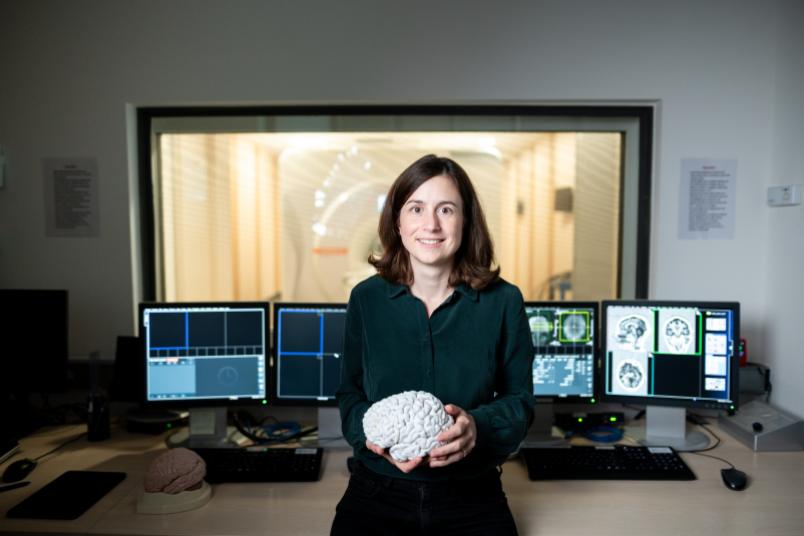
Psychology
Understanding addictive behaviour
Be it World of Warcraft or pornography: it's easy to get lost in the digital world. Stephanie Antons is researching how problematic addictive behaviour can develop from media consumption.
Dr. Stephanie Antons work leads the Duisburg-Essen psychologist to the 7 Tesla MRI of the Erwin L. Hahn Institute in Essen. Here she uses high-resolution brain scans to gain deeper insights into the activities of various brain areas and their connection to addictive behaviour.
In DFG Research Group 2974, you are currently working on a study on gaming disorder and pornography use disorder. How is the study designed?
In our current study with functional magnetic resonance imaging (fMRI), we are investigating how people react to different stimuli that are associated with addictive behaviour and what happens in the brain during this process. To do this, we work with three groups of participants: persons who exhibit addictive behaviour, persons at risk of addiction and a control group. The latter consists of people who use the media on a regular basis.
After laboratory tests and clinical interviews at the LWL University Hospital of Ruhr University Bochum, we invite the participants to an fMRI appointment at the Erwin L. Hahn Institute. In the MRI, they are shown three different stimuli. In the case of pornography use disorder for example, these are: explicit pornographic images, distal stimuli that are closely associated with addictive behaviour, such as login screens of pornographic sites, and relatively neutral control images. Throughout the images, we can determine in the fMRI scans which brain areas are particularly active in the group of people with behavioural addiction when viewing the addiction-associated images – and how the brain activity compares to the control images.
Which areas of the brain are involved?
First of all, there is the reward system. Our research suggests that, similar to people with substance addiction, this system shows greater activity when stimuli are present that are related to the specific addictive behaviour. Furthermore, we observe that a system that reflects habits is also more activated in the subjects. Therefore, we assume that addictive behaviour is carried out in an increasingly automated way and is perhaps still carried out excessively in later phases of the development of the disorder, but is no longer perceived as so strongly rewarding.
You are conducting basic research in a fairly new field of application. How does this research affect the situation of patients?
The evidence on the central mechanisms of the development and maintenance of behavioural addictions is put together piece by piece like a puzzle with each of our studies. In brain research, we can now prove that there are parallels between substance and behavioural addictions, especially with regard to the central role of the reward system. This insight is very important for the classification of the disorders and has also contributed to the gaming disorder being classified as a behavioural addiction in 2019, for example. For me, this was a special moment, because the recognition of the disorder makes it much easier to treat those affected.
At the International Conference on Behavior Addictions in South Korea this year you were awarded the “Best Paper of the Year in the Journal of Behavioral Addictions Award”. What is the paper about?
The article is dealing with the question of which therapeutic measures help patients with problematic pornography use. We analysed existing studies in a systematic review. And the results are quite encouraging, they show that cognitive behavioural therapy can have a good effect. With such a body of studies, the basis for more and better therapies can be created in the future.
